Trekking Kokoda will never be the same without the presence of distinguished elder, Faole Bokoi, to welcome trekkers as they enter Menari village.
Faole was a former luluai (clan leader), village constable, and mail carrier under Australian colonial rule. It is unlikely that he was a wartime carrier due to his estimated age. The Australian New Guinea Army Unit recruited boys over the age of 16 years as carriers. Faole would therefore have been 98 years old at the time of his passing. The average life span for PNG males is currently 62 years. It would have meant that Faole would have been 73 years of age when I first met him 25 years ago. I would have estimated his age to be 50-55 years at that time.
This is not meant to detract from the value of his service to his people as the task of carrying mailbags from Owers Corner to the changeover point on the crest between Crossing 1 and Templeton’s Crossing would have been arduous and dangerous. After meeting his fellow Orokaiva mail carriers from Kokoda there would be an exchange of mailbags and Faole would return to Owers Corner.
Faole was a wonderful caring man and a respected elder in Menari.
We are proud of the fact that we were able to contribute to his welfare through our trekkers donating approximately $2,000 each year for the opportunity to be photographed with him. We also paid for an operation on the feet of his grand-daughter, Nancy who was a baby at the time. I recently met Nancy at Owers Corner and she is now a normal healthy teenager as a result of the operation.
We were also able to provide ongoing health support for Faole over the years as we invariably have doctors and nurses on our treks. I remember Dr Jamal Rifi, who accompanied a group of Islamic teenagers on a ‘mateship trek’ with a group of young leaders from Cronulla. Dr Jamal gave Faole a complete medical examination and left his with prescription drugs to combat a chest infection he had at the time.
During my trek in November with Balmain and Blues NRL legend, Garry Jack, I felt it was the last time I would get to greet Faole at his house. He was happy to see the group as always but was too weak to come down from his verandah. There was a touch of sadness as we bid our farewells to him.
With Faole’s passing it is time to reflect again on the service and sacrifice of his people in supporting our troops during the Kokoda campaign.
As we now know Australia was unprepared for the war in the Pacific in 1942. Our faith in ‘great and powerful friends’ coming to our aid in the event of Japan entering the war was shattered with the sinking of HMAS Prince of Wales and HMAS Repulse near Singapore on 10 December 1941 and the secret deal struck by UK Prime Minister Winston Churchill and American President Franklin Roosevelt for American aid to be directed to the European theatre of operations at the expense of the South West Pacific.
The defence of Australia and its mandated territory of New Guinea was dependent on untrained militia forces and a small band of New Guinea Rifles as our experienced AIF units were returning from Europe to meet the new threat.
Resources were so scarce in New Guinea that young males were forcibly recruited to support the war effort. Many of these men from remote mountain villagers had no idea of the war and were conscripted against their will. They were told that men from Japan were the enemy. For many of these men other villagers living in remote tribal lands were also considered ‘enemy’. One can only imagine the fear and uncertainty they felt as they were forcibly marched away from their families and clans.
They were designated as Carriers but were to become known as ‘fuzzy-wuzzy angels’ because of their selfless sacrifice in assisting wounded and sick diggers during the various campaigns.
They carried vital war supplies on their bare shoulders in endless lines over hostile and inhospitable terrain. Modern day trekkers are in awe of their efforts. Without this vital link in the chain of our war effort Japan would have been successful in the conquest of New Guinea.
74 years after the Pacific War, they are the only link in the chain not to have received any official recognition. Many claim they were not properly paid. None were ever issued with a medal. No day has been set aside to commemorate their service or sacrifice.
It is difficult to understand why successive Australian governments have ignored this important omission.
According to our official history of the war in the Pacific by Dudley McCarthy (Australia in the War 1939-1945, p116) the Australian New Guinea Army Unit (ANGAU) was authorised by the Australian government to provide for:
‘the conscription of whatever native labour might be required by the Services..’
Rates of pay were to be determined and the Senior Military Officer or District Officer was empowered:
‘to have the natives so employed to enter into a contract with the Australian Government.’
It has been estimated that some 10,000 PNG nationals served as Carriers in support of the Australians during the Kokoda campaign in 1942.
A further 42,000 are estimated to have been indentured to support Australian troops in the Milne Bay and the Buna/Gona campaigns. They were paid 10 shillings per month.
According to wartime journalist, Osmar White[i]:
‘ANGAU contrived a maximum mobilization and use of native labour. At the critical period, its method of conscription was even more arbitrary than German recruiting in the early days. In some villages every able-bodied male over the approximate age of sixteen years was rounded up, transported to the clearing centres, and thence drafted to whatever type of work had priority in the immediate emergency. Brutal disciplinary measures had often to be taken in the field; but when the first and worst crises of invasion were surmounted, ANGAU did what it could to conserve the life and health of its native levies and to maintain the viability of native communities depleted of 40 or 50 per cent of their able-bodied men. Under military rule, the labourers’ health was more carefully considered and their diet in general better than under private employers before the war. ANGAU was fully aware of the value of native labour and co-operation to the Allied effort.
What is not understood by many is that male villagers indentured for work as Carriers faced two potential enemies – the invading Japanese and traditional clans whose customary land was foreign to them.
During the period 1944 to 1957 approximately 2 million pounds was paid by the Australian Government in compensation for property damage to PNG nationals by the Australian Government. In 1975 PNG gained independence and the PNG Government assumed all legal obligations for compensation of its veteran community.
Unfortunately the PNG Carriers were excluded from benefits under legislation for compensation of PNG nationals who served in the Defence Force. In 1980 they were also deemed to be ineligible for the PNG War Gratuity Scheme for ex-Servicemen.
In 1981 the Australian Government paid $3.25 million to the PNG Government under the Defence (PNG) Retirement Act as a final payment for compensation for Carriers. In 1986 the PNG Government introduced payments of PNGK1,000 for each surviving Carrier. The payments ceased in 1989 and many Carriers claim to have not received any money.
During the 50th anniversary of the Kokoda campaign the issue of payment and compensation for many of the Carriers who claim they were never paid was raised with the Keating Government however, after a few exchanges, nothing happened.
In 2009 the Rudd Government announced the New Guinea wartime carriers would receive a medallion from the Australian Government in recognition of their service. We soon discovered that this was nothing more than a media stunt. The conditions ensured that only a handful of medallions had to be produced as the issue was restricted to surviving wartime carriers or their wives. No other family members were eligible to claim a medallion on behalf of their grandfathers.
Medallions were therefore restricted to a couple of photo opportunities for politicians or dignitaries to create the perception that the issue had been resolved.
The difference between a medallion and a medal is that one can be issued as a promotion for breakfast cereals, the other has to be earned as the result of selfless service.
The issue, much to our eternal shame, remains unresolved.
Rest in Peace Faole old friend – your duty has been nobly done – you will be sadly missed but your legacy will live on.
[i] Parliament of a Thousand Tribes, The Cataclysm. P.129-130

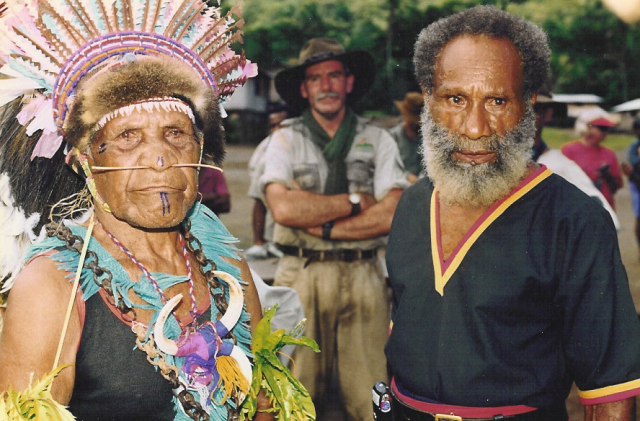
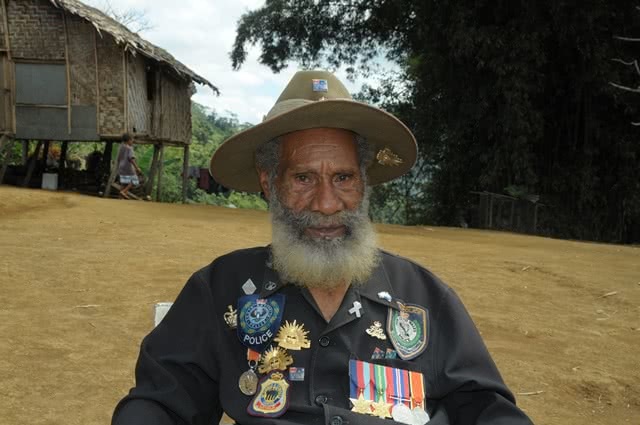
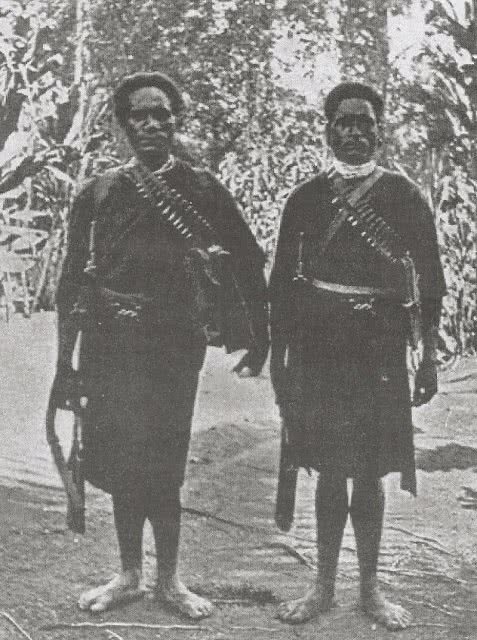
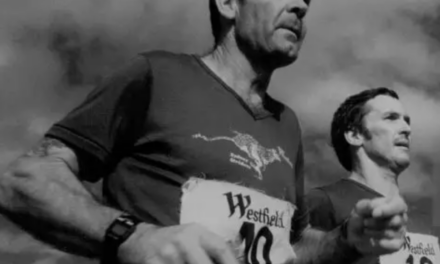


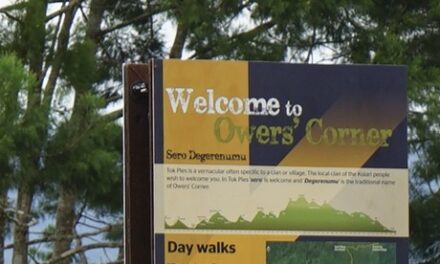
We owe all of these proud and loyal people a debt of gratitude that a couple of dollars will not repay. This debt of gratitude, owed by Australia, should not end with their passing, but transfer to their families. I hope that when I visit these proud people later this year, I can thank them in some small and meaningful way!
In fact the 1958 Census Book for Vadulogo (part of Manari where he was Village Constable at the time), freely available from the PNG National Archives, puts him down as born in 1924. Therefore he was 18 years of age in 1942 and 91 at the time of his death (92 in 2016).
However, he was still a nice bloke.
Thank you John – that is valuable information. Are you aware of any records of the names of the wartime carriers that were indentured by the Australian New Guinea Administrative Unit (ANGAU)?
My Grandfather, Jack was lucky to meet Faole on Aussie turf, when he came across with a group to attend the unveiling of a ww2 memorial in Bruce Rock in 2010. http://gsweekender.realviewdigital.com/?iid=42705&startpage=page0000007&xml=New_ZeroPage
Grandad spent a lot of time that day sitting with Faole, as only old men can. Silently, peacefully and together. One of the traveling contigent gifted Grandad a ceremonial headdress on the day, which he wore proudly whenever a new visitor would arrive out home.
Grandad passed away around 18 months ago now, and his daughters Anne (my mum) and Berna are trekking this April with myself and my brother. Grandad was really pleased to meet Faole and his family (they brought a fair contingent) and we had hoped to return the visit in April. RIP old man.